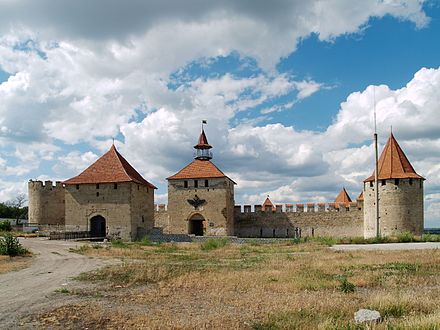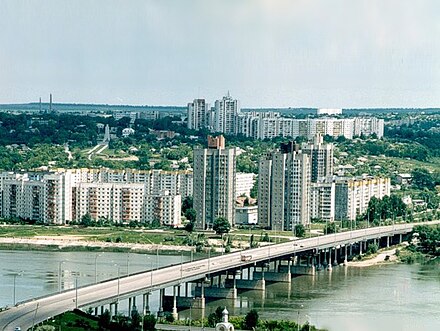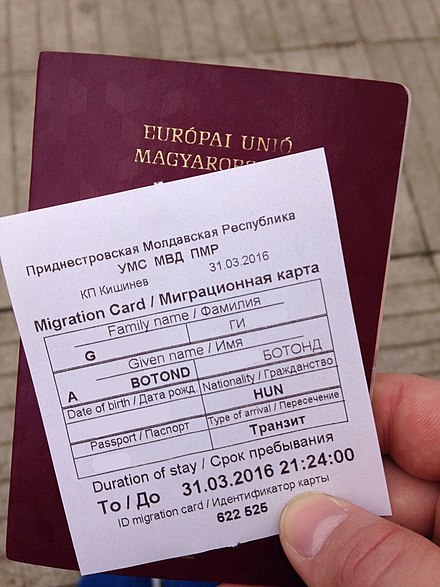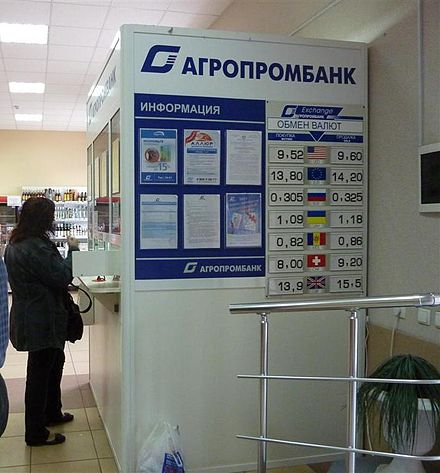Transnistria - de facto unrecognized state in Eastern Europe that has declared independence from Moldova
Transnistria is at risk of war. Due to the Russia-Ukraine conflict in early 2022, many governments advise against travel to Transnistria. See war zone safety.
The legitimacy of the Transnistrian government is not recognised by any UN member state, and most other governments consider it legally part of Moldova. However, from a traveller's point of view, that government has control of the area (separate visas, laws, currency, etc). This is not a political endorsement of claims by either side in the dispute.
Transnistria (locally called by its Russian name, Pridnestrovie (dead link: January 2023) (Приднестровие), and occasionally, in English, Trans-Dniester) is a country in eastern Europe. It seceded from but still claimed by Moldova, and is only recognised by the other breakaway states of the former Soviet Union: Abkhazia, Nagorno-Karabakh and South Ossetia. It roughly corresponds to the territory between the Dniester River and Ukraine.
While Transnistria is not a classic tourist destination, it does offer a certain Stalinist charm and is one of the few "countries that don't exist", at least according to the UN. You can thus boast of having been in a country that the rest of the world claims does not exist and banknotes in your wallet that are essentially invalid. And if it isn't for bragging rights alone that you come visit, there are some other attractions as well.
Cities


- Tiraspol 📍 – The capital with 168,000 inhabitants.
- Bendery 📍 – Inside the Moldovan territory with a beautiful fortress to its north.
- Rîbnița (Рыбница) 📍 — with two important bridges over the Dniester River, Rîbnița has a scenic location, and is home to Transnistria's largest company, a steelworks
Understand
Transnistria (official name Pridnestrovian Moldavian Republic; in Russian Pridnestrovskaia Moldavskaia Respublika, PMR) declared its independence in 1990, entailing a civil war with the much larger successor state of the Republic of Moldova that lasted until 1992.
Transnistria is a product of the messy breakup of the Soviet Union, when a part of the newly formed Republic of Moldova that wanted to stay in the Russian family, rebelled against Romanian language domination from Kishinev and decided to go its own way.
While the country is not officially recognised by any other sovereign nation, the government does effectively control the territory it claims to rule, although their actual wiggle room is perhaps a bit limited by the will of Russia, their biggest benefactor and political ally. It maintains its functional autonomy with military and other support from Russia.
Transnistria is divided into five administrative regions and two free cities.
Talk
Official languages in Transnistria are Russian, Moldovan (which is fundamentally identical to Romanian), and Ukrainian. Moldovan in Transnistria is spelled using the Cyrillic alphabet, although some people insist on spelling it with the Latin alphabet, which is a matter of dispute. The most common language used in shops, bars and taxis is Russian, which practically everyone understands and is the language of government. Moldovan and Ukrainian are understood and spoken too but to a lesser extent.
After the official languages, English and German are the most common, and Bulgarian is common in Parcani village near Bender.
However, people who speak some English (or another foreign language) can be quite shy about it, and may deny that they speak it even if they have been educated in it. Keep in mind, there is very little tourism in Transnistria, though it is rapidly increasing from basically nothing. If you are a native speaker of a foreign language, there's a good chance that you're the first native speaker the person you are talking to has ever spoken with.
Get in
The border between Ukraine and Transnistria is closed as a consequence of the ongoing war in Ukraine.
 Entering Transnistria is fairly straightforward by bus, train or car from both west (Moldova, usually Chişinău) and east (Ukraine, usually Odesa). Upon entering Transnistria, you present your passport and they'll enter your info on their computer and print out a card in Russian and English. Upon clearing immigration, this card, not your passport, is stamped – half the card stays at the crossing you entered, and half stays with you until you leave Transnistria. As of October 2018, this card was not stamped or checked during the entire visit.
Entering Transnistria is fairly straightforward by bus, train or car from both west (Moldova, usually Chişinău) and east (Ukraine, usually Odesa). Upon entering Transnistria, you present your passport and they'll enter your info on their computer and print out a card in Russian and English. Upon clearing immigration, this card, not your passport, is stamped – half the card stays at the crossing you entered, and half stays with you until you leave Transnistria. As of October 2018, this card was not stamped or checked during the entire visit.
From Chişinău to the Bendery crossing, a taxi costs 100 to 150 Moldovan lei. A marshrutka (minibus) costs around 25 lei. Marshrutkas between Odesa and the Kuchurgan border (on the main road to Tiraspol) are fairly frequent and cheap.
Mashrutkas run frequently across the Dniester from Rezina in Moldova to Rîbnița, which has a stop for buses between Tiraspol and Camenca.
When crossing the border between Moldova and Transnistria, you will be checked only by Transnistrian officials. There are also peacekeeping Russian and Ukrainian soldiers who may stop and search vehicles.
Entering Transnistria from Ukraine will not get you a Moldovan entry stamp. If you then leave Moldova through a crossing controlled by Moldovan authorities, you may have problems with the Moldovan immigration authorities, who may try to claim that you entered Moldova illegally. Exiting Moldova through Transnistria to Ukraine (whether having a Moldovan entry stamp or not) causes no problems - even a subsequent visit to Moldova through one of the border crossings controlled by the Moldovan authorities doesn't raise problems with the border guards.
If you encounter problems, complaints can be made online, where you can go to the English version and click on "hot line". You can also send a complaint to dos@gtk.idknet.com (Transnistrian Customs). There is also a complaint hotline: (+373 533 94578 or 92568. If you complain you should also state the time, the date and the name of the border crossing. You should also give your phone number. There is an English speaking officer responsible for complaints. You can reach him at +373 778 50986 or .
It is no longer necessary to register with the police (July 2018): you get a permit for up to 45 days at the entrance, depending on how long you say you want to stay. You need to provide an address or sponsor, so if you have reserved accommodation this is enough. They may ask to see the reservation. Once in Transnistria, you can extend your stay permit at the Immigration Office, and you'll need a local address. Passports are not stamped, but you'll get a paper with the departure date and time (to the seconds).
By plane
Transnistria does not have its own international passenger airport (it has a military or freight airport), so the best way is to fly to Chişinău (IATA: KIV) in Moldova and travel from there. It is also possible to come from Odesa in Ukraine by bus.
By train
The only major railway stations are Tiraspol and Bendery. There is one daily train between Odesa and Chişinău stopping at Tiraspol and Bendery as of November 2014. There are local trains running between Chişinău and Bendery but foreigners are not allowed to cross into Transnistria with these trains as there is no border control on them.
As of July 2012, there is train connection between Chişinău and Moscow, stopping at Tiraspol and Kyiv (Leaves Chişinău 22:30, stops at Tiraspol around 01:30 and arrives in Kyiv 12:30). Check Poezda CIS Railway Timetable for up-to-date, English language timetables.
By car
Cars can enter but expect delays of up to an hour at border crossings in busy times. Foreign nationals driving their own vehicles are prime targets for border guards trying to extract bribes.
If you're driving a rental car, you need an official cross border driving authorization from the rental company or else your insurance may not be valid. Not all rental companies allow you to cross so ask before booking. According to the official hotline of Transnistrian customs there is an official road tax (65 lei per week)—ask for a receipt.
In November 2019, the only crossing open to process foreign passports was at Bendery (road between Chisinau and Tiraspol). Some travellers have reported being turned back when trying to cross in the south near Purcari.
By bus
From specific destinations:
- Chişinău – There is a relatively frequent (about every 30 minutes 07:00-18:00, less frequently as early as 05:00 and as late as 22:00) bus service connecting Tiraspol. Ask for return times when you arrive. Marshrutkas (minibuses) also run this route. You should have no problem with border guards traveling by bus on this route (June 2019). From Chişinău maxi-taxis, 'microbuz' or 'marushkas' leave the (Auto)Gara Centrală behind Piata Centrala. If you walk a circle around the station, the Tiraspol/Bender bound ones tend to be on the northeastern corner. Costs: 36.50 Moldavan lei. You can use lei for paying on your way back.
- Odesa – These buses to Tiraspol are not so frequent. However, buses between Tiraspol and the border at Kuchurgan (Кучурган), and between Kuchurgan and Odesa are frequent.
.jpg/440px-Church_under_construction_in_R%C3%AEbni%C8%9Ba_(188825511).jpg)
Get around
There are hardly any train connections within the country, so the bus—if available—will be your only choice. Marshrutkas (minibuses) zip between cities much faster (and often more frequently) than buses. They cost a little more, but travel much faster and can be hailed anywhere along their route. If you flag down a marshrutka, it's customary to pay on leaving.
By taxi
Taxis in Tiraspol are very common and are quite cheap. Be wary of scams however—make sure to negotiate a price before you get in the taxi. If you miss the last bus to Chişinău at 18:35, you can take a taxi from Tiraspol to Chişinău, which should not cost more than US$30. As of August 2018, taxis booked through a local guide for this route could be negotiated as low as US$15.
See
- Noul Neamț Monastery. Daylight hours. A beautiful monastery complex just south of Tiraspol with a number of sizeable churches to explore. If you have concluded your visit to Tiraspol, take the bus back or hitch west towards Bendery, where you can catch a bus back to Chișinău. Free entry, though the tower may only be accessible if visiting as part of a tour 2019-09-09
Buy
Money
Official exchange rates for Transnistrian rubles
As of January 2022:
- €1 ≈ 18 rubles
- Moldovan lei 1 ≈ 0.9 rubles
- Russian ruble 1 ≈ 0.2 rubles
- Ukrainian hryvna 1 ≈ 0.6 rubles
- US$1 ≈ 16 rubles
- UK£1 ≈ 22 rubles Exchange rates fluctuate. Current official exchange rates are available from the Pridnestrovian Republican Bank.
The national currency is the Transnistrian ruble. There is no ISO currency code from Transnistria, but banks may use either "PRB" or "RUP" to denote the currency. Wikivoyage articles use rubles to denote the currency. 1 Transnistrian ruble is equal to 100 kopecks. Coins in Transnistria come in denominations of 5-, 10-, 25 and 50 kopecks and coins made from composite materials come in denominations of 1-, 3-, 5 and 10 Transnistrian rubles. Banknotes in Transnistria come in denominations of 1-, 5-, 10-, 25-, 50-, 100-, 200 and 500 Transnistrian rubles.
Exchange offices are common and will happily give you Transnistrian rubles in return for just about any tradeable currency. Don't change more money than you need as trying to turn Transnistrian rubles into other currencies may turn out to be difficult, even if exchange booths advertise rates to sell euros, lei, US dollars, etc., they may not be willing to relinquish their stocks of 'real' money. Don't bother trying to change Transnistrian rubles outside Transnistria as no-one will touch them.
Mastercard is not accepted anywhere, but you can pay by international Visa card in several private places that frequent foreign visitors, although Visa cards from the United States are not accepted as often as European ones. Your card is charged in Transnistrian rubles in the shop/restaurant but your bank transfer on your bank statement will be in Russian rubles. There are several international ATMs around that dispense Russian rubles and US dollars.
Shopping
Tiraspol does not have a main shopping area; shops are few and have a limited choice. Most shops and sales stands will accept Moldovan lei and Ukrainian hryvna.
The local, excellent brandy is cheap, at about US$3 a bottle. Cigarettes are very cheap too. There are also arts and crafts to buy. A good exchange point is the Kvint store in central Tiraspol, there is an exchange office with good rates inside the shop. There is also an exchange booth at the Tiraspol bus/train station.
There is a large open-air market in Tiraspol, close to the Suvorov's monument, and another in Bendery, located a few metres away from the bus and marshrutkas station. They are probably not fashionable for those looking for something closer to the western style, but interesting to see.
.jpg/440px-Noul_Neamts_monastery_is_located_5_km_from_Tiraspol_city_in_the_village_of_Chitcani._(15097599816).jpg)
Eat
There are several restaurants serving local and international cuisine. There are no western fast food chains but there is an "Andy's Pizza" restaurant on 25 October Street in Tiraspol. There are also cafeteria-style restaurants which are very cheap: usually around US$3–5 for a 3-course lunch along with dessert and a choice of drink.
Drink
Local wine and cognac are excellent and cheap. The Kvint factory is situated in Tiraspol, and Tiraspol has a Kvint shop, selling Kvint products at very low prices. Kvint produces arguably the best Cognac in the former Soviet Union, but it's extremely hard to come by in Western countries, although Moldovan supermarkets sell it. A trip to Transnistria is not complete without a sample. There is also a slightly fermented bread-based soft drink that is sold in the streets called Kvas. For about 50 US cents you can get a cold glass of Kvas which is a Russian version of dandelion & burdock or root beer.
Sleep
See Tiraspol
Stay safe

The physical dangers of Transnistria are almost non-existent. The major cities are much safer than Western European and American cities of similar size and economic makeup. Also, despite the political situation with Moldova, there is essentially no threat of being caught in a military action. There has not been fighting in Transnistria for many years. Indeed, Transnistria is a very safe place for travel. By far the biggest threat to visitors are scams.
Despite scary reports, Tiraspol is very welcoming, mainly because it gets so few tourists. Young people speak English and are helpful. The city is well-policed. Crime is low.
Many Transnistrians are excited to see foreigners and will be very welcoming, if a bit shy at first. Some, however, see foreigners as being sources of easy money. Always negotiate the price of a taxi before you get in. Use pen and paper if you are not a Russian speaker. Ask about the prices of items before you order them at a bar or restaurant. It is not common to be scammed, but it is far from rare. However, even when scams are attempted, it is often for no more than a few euros.
Be wary of police officers. If you look foreign, they will stop and ask to see your passport. Often, they will request bribes, but it should not take more than a few US dollars or euros. This practice is not condoned by the Transnistrian government, but in practice is fairly common. If you speak Russian, the chance to be asked for bribes is much lower.
Stay healthy
Medical care is almost entirely non-existent in Transnistria, especially for non-citizens. Furthermore, even if you have travel health insurance it will often not be valid in Transnistria, but valid in Moldova. It's advisable to check in advance with your insurer.
Be careful in Transnistria's bars during the night. There are often mafia-like characters having a good time with rolls of US dollars and you should not inquire too closely about the source of their wealth.
Tap water seems to be drinkable, at least in Tiraspol.
Respect
The name "Transnistria", while commonly used in English, evokes memories of the Nazi-backed Romanian occupation during World War II and the Holocaust. President Vadim Krasnoselsky, in 2019, said that the Latin name is "unacceptable for Pridnestrovie", and "foreigners should get used to saying its true name". Calling the country by the Russian name could avoid giving offense, and may win you friends.
Connect
Internet cafes are not widespread. There is one in Bendery, on Gagarin Street (close to the city market) and another one in Tiraspol, near Andy's Pizza on 25 October Street. More and more restaurants offer free Wi-Fi for their guests, for example, 7Пятницъ,"La Placinta" and Andy's Pizza in Tiraspol. Although still not frequent, you can enjoy free Wi-Fi inside new trolley buses running between Tiraspol and Bendery.
Mobile phones will work with Moldovan SIM cards (i.e. MoldCell) near the border and in many parts of Bendery. In Tiraspol, service is unreliable. If you absolutely need solid coverage while here, you can purchase a SIM from the local provider, Interdnestrcom, but you will need a 4G mobile phone capable of VoLTE on band 20 for full functionality (without VoLTE you will not be able to make voice calls, and without band 20 you will not have coverage from them at all).
